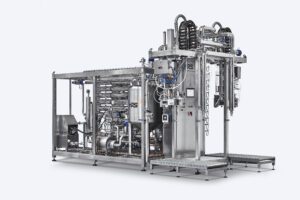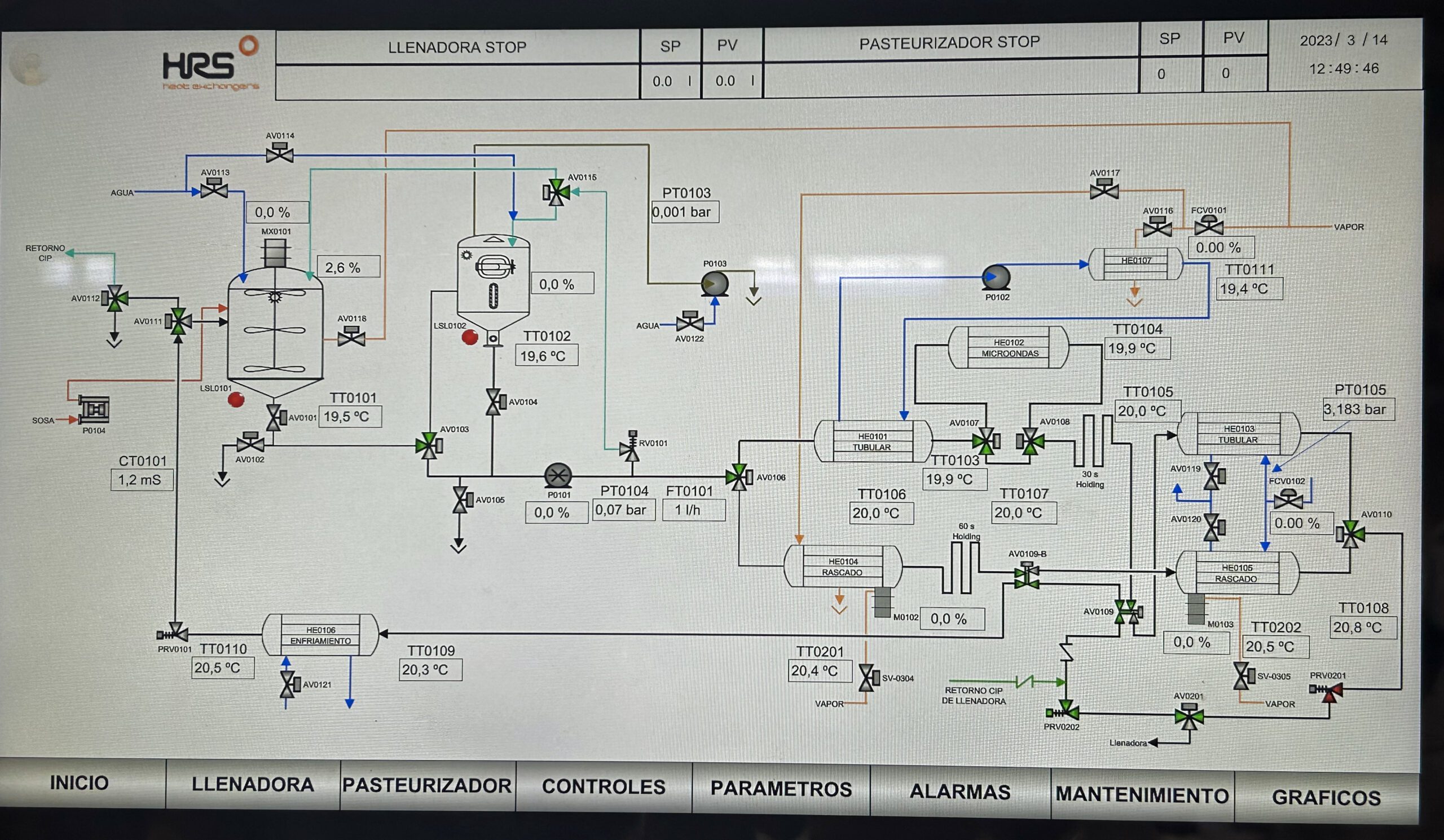For companies that operate with the latest thermal processing technology, like HRS Heat Exchangers and its clients in the food and beverage industry, being able to trial up-to-date systems and analyse the latest materials and products can pay huge dividends, particularly when such work is undertaken by experienced independent researchers and engineers.
By Matt Hale – International Sales & Marketing Director, HRS Heat Exchangers
For the last 20 years, HRS Heat Exchangers has forged a close working partnership with Spain’s National Technological Centre for the Food and Canning Industry – Centro Tecnológico National de la Conserva y Alimentación (CTNC) – a private, not-for-profit research association which works with a wide range of organisations and companies on private, national and international food and beverage development projects. Now, this alliance has been further cemented with the installation of a new pilot aseptic filling plant from HRS, giving customers and researchers the chance to test the performance of different heat exchanger types when developing new food and drink products, to achieve the best outcome for their project.

The heartland of Europe’s fruit industry

CTNC’s facilities at Molina de Segura are just ten minutes away from HRS Heat Exchangers’ Spanish office and manufacturing facilities in Murcia– the heart of Europe’s fruit growing region. It provides the ideal conditions for HRS and its clients to benefit from the CTNC testing and technology services, which includes laboratories covering microbiology, instrumentation, packaging, physical and chemical quality control, food safety, and water and environment testing.
Established in 1962 as part of the University of Murcia, The CTNC now has its own facilities and operates as an independent public utility overseen by Spain’s Ministry of Internal Affairs. Its particular focus on food, environment and the circular economy fits perfectly with the areas in which HRS works. HRS’ longstanding reputation as a leader in the field of thermal technology, as well as its location in the heart of Murcia, make it the obvious choice to partner with the centre. As a result, a variety of HRS equipment including corrugated tube and scraped surface heat exchangers, and an HRS Asepticblock treatment and packing system, is in use within the CTNC technological area, for researchers and HRS customers alike to use.

Unique testing capabilities
In practice, this means that clients can access the facilities at the CTNC to test how their products will perform with different heat exchangers (as well as microwave heating), so that they and HRS engineering staff can choose the best heat exchanger option for their requirements.
Presentación García Gomez, Head of the Technological Area at the CTNC, explains: “This region of Spain is home to a high volume of fruit producers, as well as primary and secondary processors, so there is significant demand from companies wanting to trial new products or processes on the new aseptic pilot plant from HRS. There is no other pilot plant like this in Spain, and we currently have around 15 companies on the waiting list, looking to either develop new food and drink products or move from conventional heat treatment to aseptic packing.”
The rise of aseptic packaging
Traditionally, hot filling of food and drink products sterilises the container as the product (which is still hot from cooking or sterilising) is filled. However, the temperatures required often have unwanted effects on the quality of the product, and the heat imposes restrictions on the type of container which can be used: for example, hot filling of lightweight plastic drinks bottles can lead to distortion of the plastic.

Because of this, cold aseptic filling has become a common technique with drinks manufacturers for products including UHT milk, fruit juices, and sports and energy drinks. Its flexibility means that it is suitable for a wide range of products from fresh fruit dices and purees to marinades and dairy products.
The HRS Asepticblock pilot plant installed at the CTNC is a special trial version of the standard HRS Asepticblock Series of skid-mounted self-contained pasteuriser/steriliser systems with integrated aseptic filler. The unit at the CTNC features a balance tank and a deaerator (to prevent oxidisation), and a product pump. The product goes through a pre-heating stage, followed by a choice of heat treatments (heating or cooling) which are chosen via a control panel.
The available options include heat exchangers (corrugated tubular, MI multitube and DTA double tube along with the HRS R Series scraped surface) and a microwave heating unit. Because of the benefits of HRS clients being able to use the technology, HRS Heat Exchangers supplied the unit at cost to the CTNC.
At the forefront of latest food trends
“Our customers can use the pilot plant when developing new projects, for proof of concept. They can then determine which type of heat exchanger works best for which product,” explains Paco Hernandez, Food Business Director for HRS Heat Exchangers. “As the CTNC is a research centre, there is also the potential to handle new and upcoming products, placing us at the forefront of new trends in the food processing sectors. In addition, the CTNC demonstrates our technologies and the efficiency of our equipment, increasing awareness of our brand and potentially introducing us to new markets and clients.”
Partnering with the CTNC also gives HRS access to a variety of different types of products and materials that they might not otherwise have access to. This enables them to test their heat exchangers and systems with a wider range of materials, each with different textures, viscosities, and thermal properties. It also means that HRS can analyse new materials from customers and clients that they may not have worked with before (such as sludges generated by environmental applications), helping to further their capabilities.
Presentación García Gomez adds, “At the CTNC, we are at the forefront of food technology, witnessing the latest trends such as improvements in sustainability and moves to digitalisation. We have received European funding for research into sustainable food production, including better use of raw materials, energy and water, and making better use of waste and by-products. We are also at the vanguard of the move towards more plant-based products and new sources of protein to avoid the use of animal products. Fermented beverages, such as kombucha, are another trend we are seeing, and these are also aseptically processed.”

A fruitful partnership
For Presentación and the team at the CTNC, partnering with an industry-leading company like HRS is crucial to their ongoing success. “CTNC is recognised by major organisations such as the FDA, BRC, IFS and Health Department of Murcia and all our analysis is covered by European accreditation. We are confident that HRS are the leaders in aseptic technology and their equipment is of very high quality.
“We have been working with them since 1998 and when we were looking to upgrade our original pilot plant, HRS was again the obvious choice. It helps that they are located so close to us – if we need to make changes or modifications or if we have any questions, they can be on site within minutes. But they also have a vast amount of expertise and knowledge in the area of food and beverage production, particularly fruit processing. They are always open to our ideas and suggestions, making it a very collaborative relationship. HRS continue to innovate and have stayed at the forefront of the industry, which is why they are still our preferred partner more than 20 years after we began working with them.”
About HRS heat Exchangers
Located in the UK and Spain, HRS Heat Exchangers is part of the EIL Group (Exchanger Industries Limited) which operates at the forefront of thermal technology. HRS offers innovative heat transfer solutions worldwide across a diverse range of industries. With more than 40 years’ experience in the food and drink and environmental sectors, HrS products are compliant with global design and industry standards.

